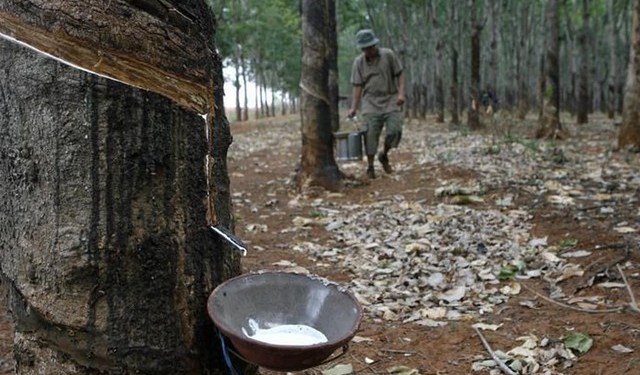BANGKOK: Prime Minister Prayut Chan-o-cha has instructed government agencies to expedite their purchase of natural rubber in the local market as part of a bid to boost domestic demand and help prop up falling prices, a government spokesman said.

Prime minister Prayut(filepic), however, has turned down a request by rubber farmers for an order under Article 44 of the post-coup interim charter to make it mandatory for state agencies to buy rubber for their use, according to the spokesman.
Lt-General Sansern Kaewkamnerd, the spokesman attached to the Prime Ministers Office, said that the nine state agencies involved would spend 16.9 billion bhat to buy more than 22,000 tonnes of rubber latex and almost 3,000 tonnes of rubber sheets for their use.
The prime minister, however, has turned down a request by rubber farmers for an order under Article 44 of the post-coup interim charter to make it mandatory for state agencies to buy rubber for their use, according to the spokesman.
The prime minister is well aware of the suffering of the rubber farmers. But he maintained that there was still no need to invoke Article 44 to help reduce legal obstacles and make it compulsory to use local rubber. It is because the problem is being tackled and progress has been made gradually, Sansern said.
General Prayut’s powers under Article 44 have remained under the new constitution in effect since early April.
As head of the ruling juntas National Council for Peace and Order, he is empowered to issue orders with the goal of reforming the country that bypass the existing laws and powers of the three branches of government.
So far, nine state agencies have informed the prime minister of their intention to use local natural rubber for their projects. These are the Agriculture and Cooperatives, Defence, Transport, Education, Natural Resources and the Environment, Public Health, Interior and Tourism and Sports ministries, as well as the Bangkok Metropolitan Administration.
The rubber supply to be bought is for road construction and the production of products such as boots, gloves, pipes and rubber sheets.
The prime minister has instructed the nine agencies to speed up their budget spending to help stimulate the domestic consumption of natural rubber before the end of the current fiscal year at the end of September, Sansern said.
According to the spokesman, the Royal Irrigation Department has received 100 tonnes of rubber from the Rubber Authority of Thailand for its project to repair asphalt roads with a total length of 3,000 kilometres.
The government has come under mounting pressure from rubber growers to help prop up the falling prices. Groups of planters in the South have called on the prime minister to use his power under Article 44 to demand state agencies to use rubber in their projects, in order to help boost prices.
General Prayut also has instructed the relevant agencies to expedite establishment of a fund to help stabilise local rubber prices, to which the country’s five major rubber exporters would contribute Bt200 million each.
Meanwhile, leaders of small-time rubber planters in the South met with local military authorities in Nakhon Si Thammarat yesterday following their signature campaign to call for the removal of the governor and executive board members of the Rubber Authority of Thailand.
The five leaders of the rubber growers had earlier been summoned to meet the authorities from the 41st Military Circle and the Internal Security Operations Command at a local military camp. But the venue was later changed to the Provincial Hall to make it appear more relaxed, according to a source.
The group has started a campaign to collect at least 50,000 signatures to call for removal of the top executives of the Rubber Authority of Thailand, whom they blamed for the falling rubber prices
The group maintained that they would continue with their signature campaign. — The Nation (Thailand)




























